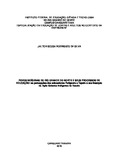Povos indígenas do Rio Grande do Norte e seus processos de educação : as percepções dos educadores Potiguara e Tapuia e sua inserção na Ação Saberes Indígenas na Escola

Visualizar/
Data
2019-04-04Autor
Silva, Jailton Sousa Rodrigues da
http://lattes.cnpq.br/5693122186022405
Metadado
Mostrar registro completoResumo
This work proposes to reflect on the Indigenous School Education (ISE) of Rio
Grande do Norte (RN) - from the perspective of its educators - and about their
communities, their schools and the education experienced in them. The objective of
this study is to understand the perceptions of the educators participating in the
Federal Public Policy focused on the education of indigenous peoples and named
"Action Indigenous Knowledge in the School" (AIKS), considering the socio-political
action of each one and the formal organization of knowledge of their ethnic groups.
The research object, as for theory, ranged from subjects such as Education, School,
Ethnic Identity, Ethnogenesis, Ethnic Group and Territorialization. Field work was
done through participant observation and shared interviews, in the midst of the
dialogue with the interlocutors, during the AIKS implementation phases. In the face of
this research, we realize that the AIKS of the peoples studied is an eminently political
issue, since it is an integral part of its Reterritorialization - an equally political process,
whose central axis is the experience of the Ethnic Identity mobilized by each
indigenous group at the historical moment of its relationship with the State. Thus, we
conclude that for the educators the ISE is a kind of qualification towards the
officialisation of their Indigenous Schools, and this is the main target, since they
represent a form of ratification of the recognition of the State to their ethnic groups. It
was also noted that, for some indigenous peoples, participation in ASIE is a first step
in a way in which the Indian can participate in global society on an equal footing with
non-Indians, even if it is necessary to postpone the affirmation of a greater
differentiation with respect to that same society.



